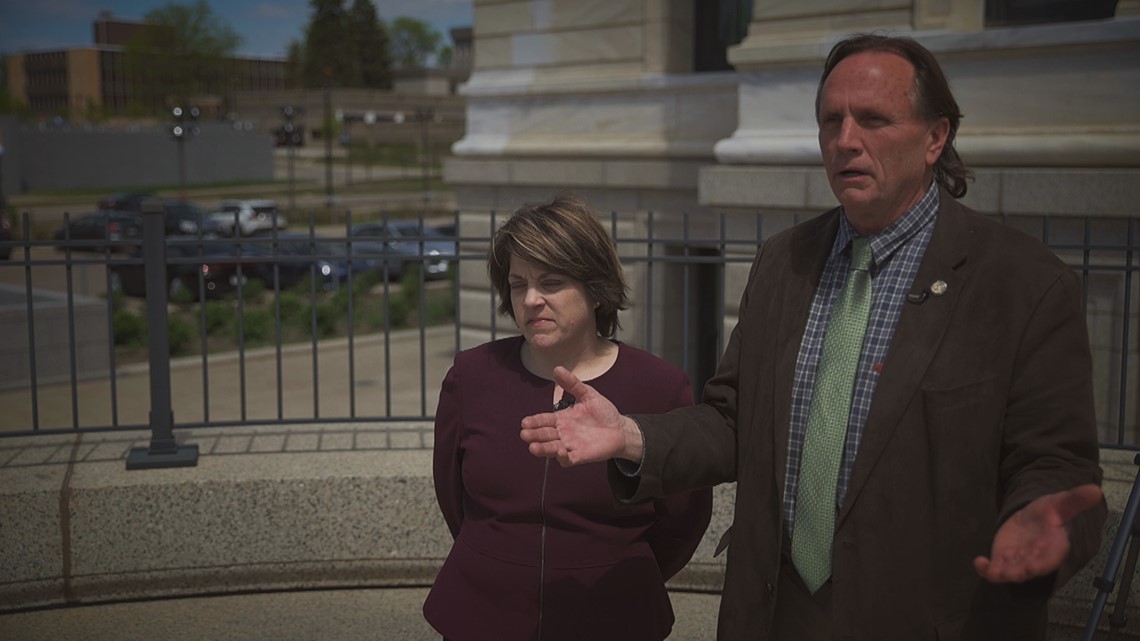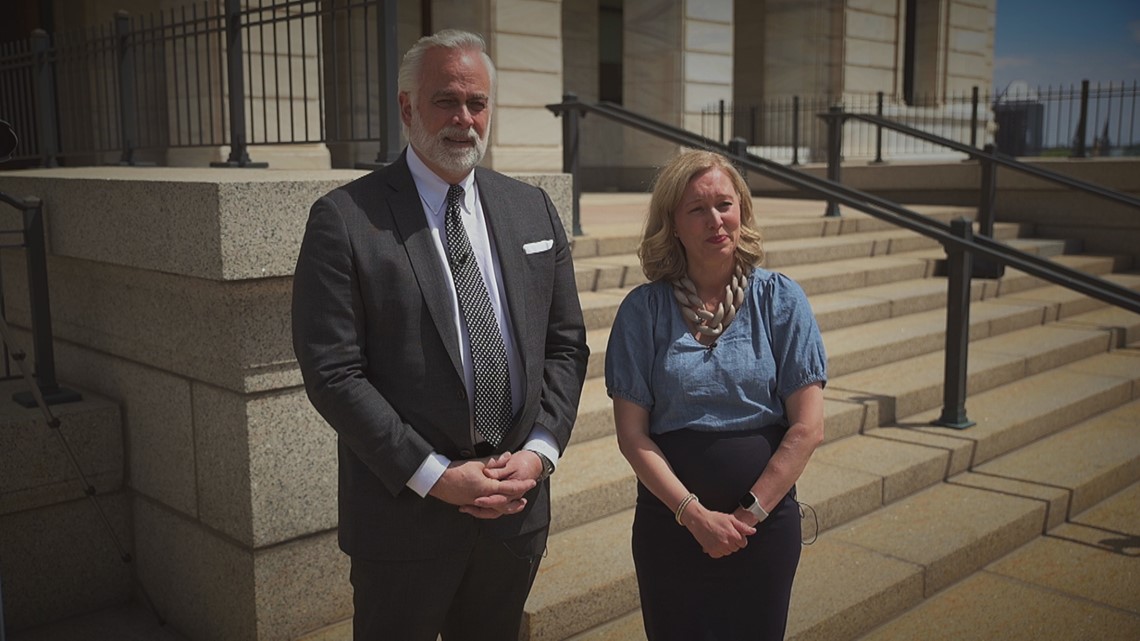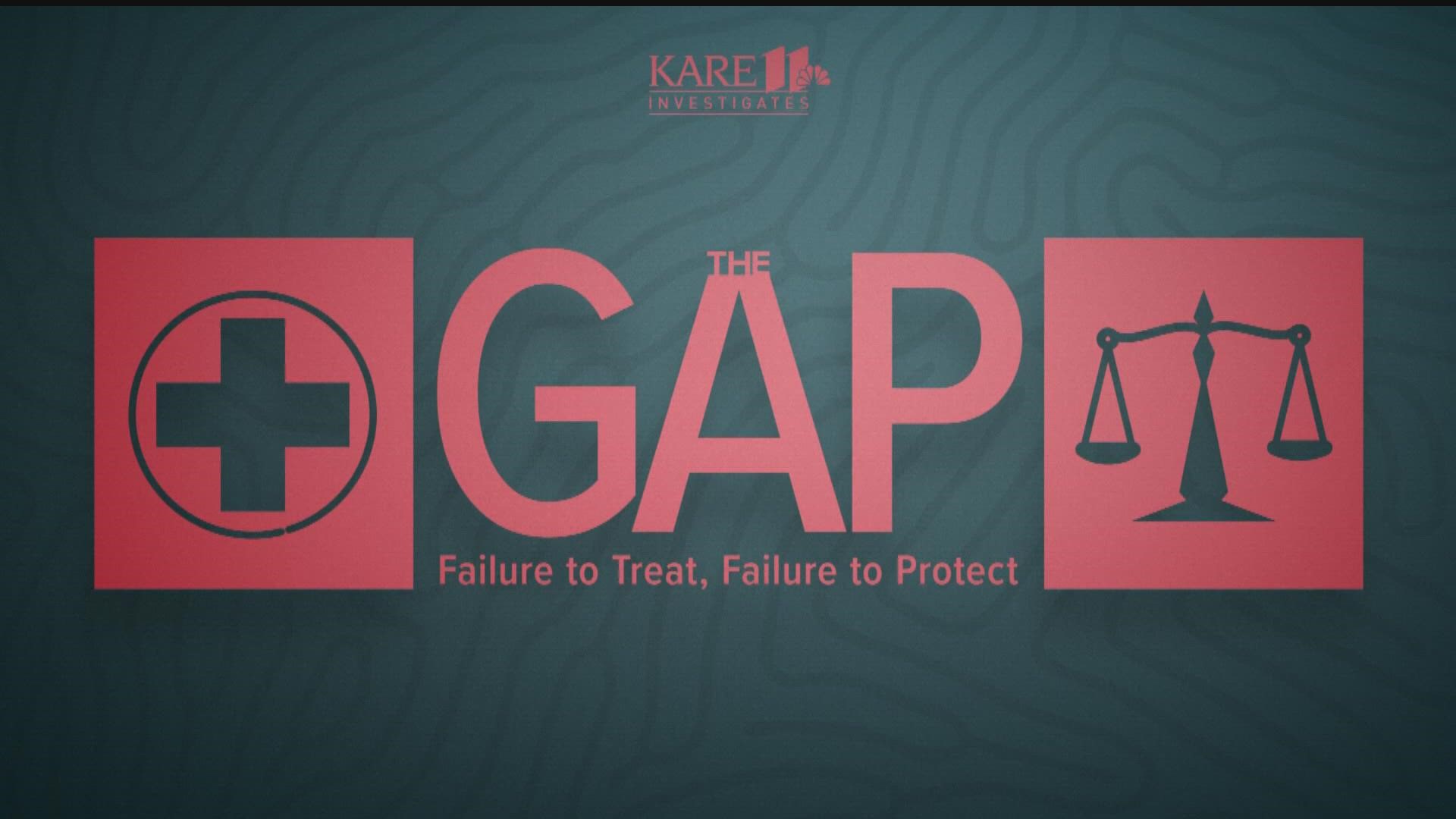ST PAUL, Minn. — With the clock fast approaching midnight on Sunday, the Minnesota Legislature passed bipartisan, historic reforms to close the gap between the state’s mental health and criminal justice systems for mentally ill defendants.
After its expected signature by Gov. Tim Walz, more than $30 million will be spent to supervise and treat people charged with crimes who are too mentally ill to stand trial – and create more than 120 new jobs to do it.
The bill’s passage comes during the trial for Gregory Ulrich, who is accused of killing one woman and wounding four others during a mass shooting at a Buffalo, Minn. hospital last year. Ulrich’s case prompted KARE 11’s investigative series, “The Gap: Failure to Treat, Failure to Protect,” which sparked the reforms.
Prior to the shooting, Ulrich had been charged in connection with making threats to kill health care workers at a Buffalo clinic. However, those charges were dropped after Ulrich was found too mentally ill to stand trial in that case. As a result, he went untreated and unsupervised before the shooting – and was legally able to obtain a gun.
KARE 11’s investigation found that there were several thousand cases in Minnesota involving people like Ulrich who were charged with a crime, found incompetent, and had their cases dismissed without court-ordered treatment.
In addition, KARE 11 documented cases in which treatment was ordered but defendants were released into the community while still incompetent to stand trial – without adequate follow-up treatment or supervision.


Though no state or local agency kept track of how often those defendants went on to re-offend, KARE 11 Investigates found dozens of cases where defendants went on to commit arsons, violent assaults, rapes, shootings and murders.
“People can feel safer knowing that dangerous persons are going to be kept track of, and they’ll get care,” said Sen. Jim Abeler, a Republican and one of the champions of the reforms. “This will reduce the chances of them committing other crimes.”
One final vote
Sunday night’s landmark vote almost didn’t happen, despite widespread bipartisan support and the full backing of law enforcement, prosecutors, public defenders, judges, and mental health advocates.
After months of negotiations, the House overwhelmingly approved the reforms on May 11, sending the bill to the Senate.
The Senate put those reforms into a larger mental health omnibus bill, which they passed unanimously around 9:30 Sunday night. But because the Senate added amendments to the legislation, the full omnibus bill had to go back to the House for another vote.
That didn’t happen until 11:52 last night, prompting House Minority Leader Kurt Daudt to speak out against the bill.
“Unfortunately, there are a lot of areas where this bill falls short,” said Daudt.
The House narrowly passed it 68 to 60 – the final vote before the end of the session.
Breaking it down
To understand what the bill does, it is important to understand the problems it attempts to solve.
If a defendant charged with a crime was found too mentally ill to stand trial, there was little ability for state courts, law enforcement and treatment providers to help that defendant while also protecting the public.
It is unconstitutional to keep incompetent defendants in jails without treatment – and currently almost no jail in the state provides that. What’s more, KARE 11’s investigation discovered in Minnesota it was no one’s job to provide competency restoration. And existing laws gave judges no ability to order it.
While judges could order some defendants to get mental health treatment under the state’s civil commitment laws, that’s not the same as restoring them to competency.
And even if the defendants were civilly committed, they were often still released into the community while incompetent to stand trial. Then they were supervised by a patchwork of social workers who may not have specialized in handling those types of cases.
Ultimately, those incompetent defendants fell through cracks in the state’s criminal and mental health systems – where they were informally labeled “gap cases.”


The new law gives judges the authority to order those defendants to get treatment to restore them to competency – and creates and funds statewide competency restoration programs, including in jails.
In cases like Ulrich’s, the previous law required charges to be dismissed for defendants found incompetent for misdemeanors and gross misdemeanors cases.
The new law closes that gap, carving out exceptions for “targeted misdemeanors” such as domestic abuse or restraining order violations.
The job of assisting and supervising incompetent defendants falls to a newly created position of forensic navigator, who must create “bridge plans” to connect the defendants to competency restoration, housing, mental health therapy and other supports.
"The best thing is that it really makes sure people are connected to services in the community," said Sue Abderholden, the executive director of the National Alliance on Mental Illness Minnesota, a key supporter of the reforms. "To have someone there that can be engaging with the person, making sure that they’re in treatment, making sure that they’re getting their needs met, stable housing all of it – I think that’s going to be huge."
The bill authorizes spending more than $20 million beginning in fiscal year 2024 to fund the reforms. A newly created State Competency Restoration Board will develop the training for 120 forensic navigators and competency restoration education standards for defendants.
Should the courts determine that a defendant is unlikely to ever be returned to competency, a judge can still order continued supervision of that person for serious public safety risks.


The bill also authorizes the criminal court to force a defendant to take medications under limited circumstances to attain competency to stand trial.
The law also closes another loophole exposed by Ulrich’s case. He was able to legally buy a handgun after a prosecutor dismissed his case following his incompetence finding. Under the new law, a judge must pronounce a defendant incompetent, which triggers a provision in state law that makes such defendants ineligible to obtain a firearm.
“Our communities are going to be safer,” said DFL Rep. Heather Edelson, the co-author of the House bill along with Rep. Tony Albright, a Republican. “This will save lives.”
"What was accomplished last night is life changing for so many families and so many communities," Albright said.
Watch more KARE 11 Investigates:
Watch all of the latest stories from our award-winning investigative team in our special YouTube playlist:

